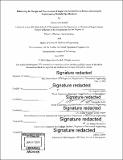Enhancing the design and procurement of single-use assemblies in biomanufacturing by implementing modular specifications
Author(s)
Rendall, Clinton Scot
DownloadFull printable version (7.061Mb)
Other Contributors
Leaders for Global Operations Program.
Advisor
Stephen Graves and J. Christopher Love.
Terms of use
Metadata
Show full item recordAbstract
Usage of single-use systems (SUS) in biomanufacturing has expanded rapidly in recent years. Amgen uses SUS at several commercial manufacturing sites, in addition to pilot plants and clinical production. Each single-use assembly is typically custom designed and manufactured by a third-party integrator. This has led to the proliferation of single-use specifications, with hundreds of assemblies in the Amgen library. These specifications collectively require tens of thousands of manhours to create, maintain, and eventually decommission. In addition, the purchase of so many unique assemblies hinders the ability to competitively bid on each design, increasing commercial risk. Finally, each Amgen site must maintain required inventory levels of its specific assemblies, with few opportunities to optimize safety stock between facilities. The goal of this project is to evaluate the hypothesis that increasing the usage of modular design principles will reduce procurement cost, supply risk, and inventory requirements. In addition, standardization of SUS will result in the creation of fewer unique assemblies, greatly reducing the overhead requirement from the engineering, quality, and process development organizations. This thesis proposes actions Amgen may implement to achieve a more modular SUS design framework and to realize the aforementioned benefits. Studies completed during this research are supportive of increased modularity. An inventory analysis showed that safety stock levels decrease by 30% when a sample of similar assemblies are shared between sites. A study of a new single-use process at an Amgen site suggests that adopting two modular approaches genderless aseptic connectors and sterile welding - yield the most desirable outcome, with 5-year NPV savings exceeding $3 million USD. This number would increase substantially if applied to SUS across commercial manufacturing. While only modestly reducing the number of required assemblies, this scenario also involves the least amount of time required to connect the assemblies and address nonconformances. Some modular design practices, such as utilizing standard lengths and building large assemblies out of small ones, are counterproductive due to the increased number of connectors and potential for leaks. Therefore, a moderate modular approach is recommended, along with the adoption of supplier standard designs when available.
Description
Thesis: M.B.A., Massachusetts Institute of Technology, Sloan School of Management, in conjunction with the Leaders for Global Operations Program at MIT, 2018. Thesis: S.M., Massachusetts Institute of Technology, Department of Mechanical Engineering, in conjunction with the Leaders for Global Operations Program at MIT, 2018. Cataloged from PDF version of thesis. Includes bibliographical references (pages 63-64).
Date issued
2018Department
Leaders for Global Operations Program at MIT; Massachusetts Institute of Technology. Department of Mechanical Engineering; Sloan School of ManagementPublisher
Massachusetts Institute of Technology
Keywords
Sloan School of Management., Mechanical Engineering., Leaders for Global Operations Program.